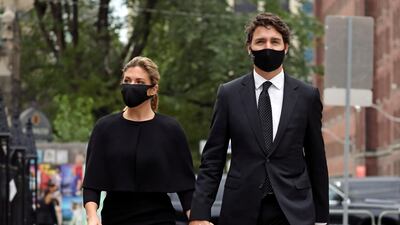US President Donald Trump has become the latest world leader to contract the coronavirus that has infected more than 33 million people and killed more than a million this year. Here’s a look at other countries whose leader have had the virus.
Britain
Prime Minister Boris Johnson was the first major world leader confirmed to have Covid-19. He was moved to intensive care in April after his symptoms dramatically worsened a day after he was hospitalised for what were called routine tests. He was given oxygen but did not need a ventilator, officials said. He later expressed his gratitude to National Health Service staff for saving his life when his treatment could have “gone either way”.
Brazil
President Jair Bolsonaro announced his illness in July and used it to publicly extol hydroxychloroquine, the unproven malaria drug first touted by Mr Trump, that he had been promoting as a treatment for Covid-19 and was taking himself. For months he had flirted with the virus as he flouted social distancing at lively demonstrations and encouraged crowds during outings from the presidential residence, often without a mask.
Honduras
President Juan Orlando Hernandez announced in June that he had tested positive, along with two other people who worked closely with him. Mr Hernandez said he had started what he called the “MAIZ treatment”, an experimental and unproven combination of microdacyn, azithromycin, ivermectin and zinc. He was briefly hospitalised and released. He has added his voice to growing pleas for equitable access to any Covid-19 vaccine, asking the recent UN gathering of world leaders, “Are people to be left to die?”
Belarus, Armenia and Russia
President Alexander Lukashenko, who dismissed concerns about the virus as “psychosis” and recommended drinking vodka to stay healthy, said in July he had contracted it himself but was asymptomatic. Belarus is one of the few countries that took no comprehensive measures against the virus. Other top officials in former Soviet states who were infected include Armenian Prime Minister Nikol Pashinyan and Russian Prime Minister Mikhail Mishustin.
Guatemala
President Alejandro Giammattei said he tested positive for the virus in September. “My symptoms are very mild. Up to now, I have body aches, it hurt more yesterday than today, like a bad cold,” he said during a televised address. “I don’t have a fever, I have a bit of a cough.” He said he would be working from home.
Bolivia
The virus drove the interim president Jeanine Anez into isolation in July, but she said she was feeling well.
Dominican Republic
Luis Abinader, the newly elected president, contracted and recovered from Covid-19 during his campaign. He spent weeks in isolation before the country’s July election.
Iran
Iran, the epicentre of the Middle East’s initial coronavirus outbreak, has seen several top officials test positive. Among them are senior Vice President Eshaq Jahangiri and Vice President Massoumeh Ebtekar. Cabinet members have tested positive, too.
India
Vice President M Venkaiah Naidu, 71, recently tested positive but his office said he had no symptoms and was quarantined at home. Home Minister Amit Shah, the No 2 man in Prime Minister Narendra Modi’s government, was hospitalised for Covid-19 last month and has recovered. Junior Railways Minister Suresh Angadi last week was the first federal minister to die from Covid-19.
Israel
Yaakov Litzman tested positive in April, while he was Israel's health minister, and recovered. Mr Litzman is a leader in Israel’s ultra-Orthodox community, which has seen a high rate of infection as many have defied restrictions on religious gatherings. The minister for Jerusalem affairs, Rafi Peretz, tested positive over the summer as cases surged nationwide and recovered.
South Africa
The country's mineral resources and energy minister, Gwede Mantashe, and Labour Minister Thulas Nxesi were infected as cases surged in June and July.
South Sudan
Vice President Riek Machar was among several Cabinet ministers infected.





















